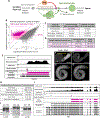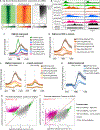A cell type-specific surveillance complex represses cryptic promoters during differentiation in an adult stem cell lineage
- PMID: 40769719
- PMCID: PMC12333557
- DOI: 10.1101/gad.352747.125
A cell type-specific surveillance complex represses cryptic promoters during differentiation in an adult stem cell lineage
Abstract
Regulators of chromatin accessibility play key roles in cell fate transitions, triggering the onset of novel transcription programs as cells differentiate. In the Drosophila male germline stem cell lineage, tMAC, a master regulator of spermatocyte differentiation that binds thousands of loci, is required for local opening of chromatin, allowing activation of spermatocyte-specific promoters. Here we show that a cell type-specific surveillance system involving the multiple zinc finger protein Kmg and the pipsqueak domain protein Dany dampens transcriptional output from weak tMAC-dependent promoters and counteracts tMAC binding at thousands of additional cryptic promoters, thus preventing massive expression of aberrant protein-coding transcripts. ChIP-seq showed Kmg enriched at the tMAC-bound promoters that it repressed, consistent with direct action. In contrast, Kmg and Dany did not repress highly expressed tMAC-dependent genes, where they colocalized with their binding partner, the chromatin remodeler Mi-2 (NuRD), along the transcribed regions rather than at the promoter. We discuss a model where Kmg, together with Dany and Mi-2, dampens expression from weak or ectopic promoters while allowing robust transcription from highly expressed Aly-dependent genes.
Keywords: Drosophila; NuRD complex; chromatin regulation; cryptic promoters; spermatogenesis; transcriptional repression.
© 2025 Matias et al.; Published by Cold Spring Harbor Laboratory Press.
Conflict of interest statement
Competing Interest Statement
The authors declare no competing interests.
Figures







Update of
-
A cell-type specific surveillance complex represses cryptic promoters during differentiation in an adult stem cell lineage.bioRxiv [Preprint]. 2025 Feb 26:2025.02.25.640250. doi: 10.1101/2025.02.25.640250. bioRxiv. 2025. Update in: Genes Dev. 2025 Nov 3;39(21-22):1318-1337. doi: 10.1101/gad.352747.125. PMID: 40060570 Free PMC article. Updated. Preprint.
References
-
- Baker Catherine C., Gallicchio Lorenzo, Matias Neuza R., Porter Douglas F., Parsanian Lucineh, Taing Emily, Tam Cheuk, and Fuller Margaret T.. 2023. “Cell-Type-Specific Interacting Proteins Collaborate to Regulate the Timing of Cyclin B Protein Expression in Male Meiotic Prophase.” Development (Cambridge) 150 (22). 10.1242/dev.201709. - DOI - PMC - PubMed
MeSH terms
Substances
Grants and funding
LinkOut - more resources
Full Text Sources
